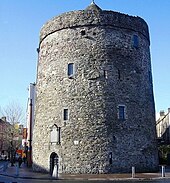Siege of Waterford (1495)


An eleven-day Siege of Waterford took place, in 1495, after the pretender to the throne of Henry VII, Perkin Warbeck's failed attack on Deal, Kent. Warbeck was joined by Cork's Maurice FitzGerald, 9th Earl of Desmond when they went to Ireland and launched an invasion of Waterford on 23 July 1495.[1]
Supported by "foreign mercenaries", Warbeck's force besieged the city; however, its walls were well-defended and the marshes to the east of the city were flooded by the damming of St. John's River.[2] Attacks towards the city were repulsed and were followed by counterattacks into the besiegers' camp. These counterattacks resulted in the capture of several prisoners who were dragged into the city and beheaded.[3][2] The defenders also had cannons on the walls of the city in Reginald's Tower that were used to fire on the attacking ships. These cannons succeed in sinking two of the eleven ships they faced. The battle ended on the eleventh day of the siege and was a loss for Warbeck's force. Warbeck himself escaped following the failed siege,[2] while his supporter, Maurice FitzGerald, was "forgiven" by the crown for his role in the attack.[4]
In the years following victory, the town's motto was granted by Henry VII as Urbs Intaca Manet Waterfordia ('the city of Waterford remains untaken').[5] This battle contains the earliest recorded use of cannons in Irish history.[3]
See also
References
- ^ Macdougall, Norman (1989). James IV: Stewart dynasty in Scotland. John Donald Publishers Limited. p. 120. ISBN 9780859762007.
- ^ a b c "The Siege of Waterford 1495". waterfordtreasures.com. Retrieved 26 November 2021.
- ^ a b Doherty, Andrew (19 April 2019). "1495 Siege of Waterford". Waterford Harbour Tides and Tales. Retrieved 26 November 2021.
- ^ Webb, Alfred (1878). "Maurice Desmond, 10th Earl". A Compendium of Irish Biography. Dublin.
He sided with the pretender, Perkin Warbeck, in the siege of Waterford [..] Nevertheless, making humble submission, the King not only forgave, but took him into favour
{{cite book}}: CS1 maint: location missing publisher (link) - ^ "A hidden gem ready to be claimed". irishtimes.com. Irish Times. 18 April 2008. Retrieved 16 January 2022.
Henry VII marked the steadfastness of Waterford with the motto Urbs intacta manet Waterfordia ("The city of Waterford stays untaken"), after the city had weathered a siege by the forces of a pretender to the English throne, Perkin Warbeck, in 1495
